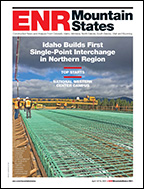 |
| View of 'Mixing Bowl' project, looking southwest (photo courtesy of Virginia DOT) |
An audit from the U.S. Dept. of Transportation's inspector general's office has found that costs of a Virginia interchange project have risen 180% since 1994, to $676.5 million, and called for federal and state officials to tighten oversight of the job. The IG's report, issued Nov. 22, basically confirms a March estimate from the Virginia DOT, which put the cost of the "mixing bowl" interchange upgrade in Springfield at $650 million to $700 million.
But the IG warns that the project still faces "significant risks of further cost increases." The report also notes that high-occupancy-vehicle ramps were shifted from the interchange to a future project and says that including the HOV item would boost the mixing bowl tab to $760.5 million.
In written comments on an earlier draft version of the audit, the Federal Highway Administration and VDOT indicated they concurred with the IG recommendations.
The complex job is located where Interstates 95 and 395 meet the Capital Beltway, near Washington, D.C.
The IG attributes the $435.5 million in cost jumps to three factors: 1) $140 million for addition of new elements after initial estimates were done; 2) $236.5 million for preliminary engineering and other already known expenses that the IG says VDOT excluded from earlier estimates; and 3) $59 million for cost hikes that weren't anticipated.
The audit also says that the increases at the mixing bowl have drawn funds from projects elsewhere in the state.
The June 1994 estimate for the project was $241 million. In 2000, VDOT raised that to $509 million. The project originally was to be finished in 2011, but VDOT had pushed up the timetable to 2007. Now, the DOT IG says, there is "substantial risk" that the 2007 target won't be met.
The IG's recommendations for improved federal and state oversight of the project include requiring a VDOT financial plan with "reasonable cost estimates, adequate funding and reliable schedules." It also calls for VDOT to prepare an "integrated master schedule" for the overall project and "resource-loaded schedules" for each of the job's phases.


Post a comment to this article
Report Abusive Comment